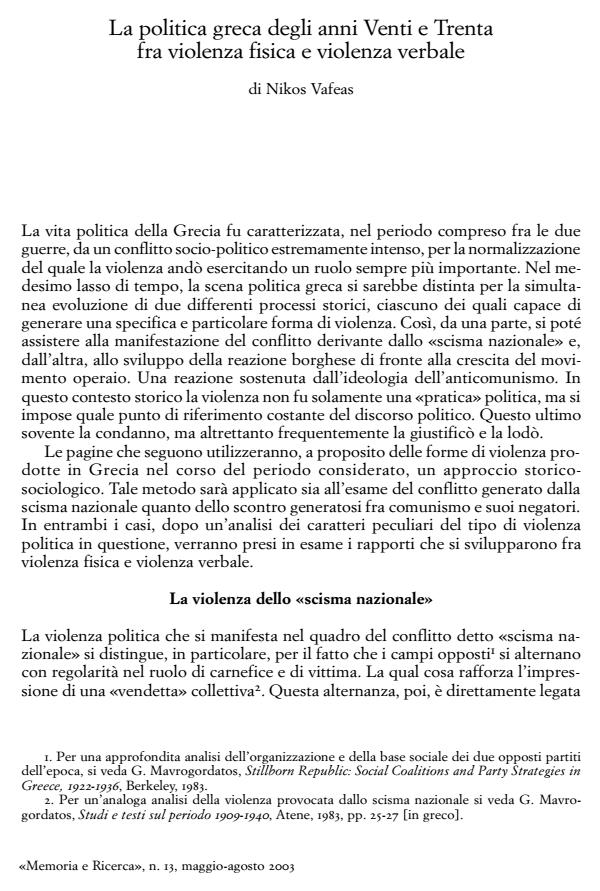La politica greca degli anni Venti e trenta fra violenza fisica e violenza verbale
Titolo Rivista MEMORIA E RICERCA
Autori/Curatori Nikos Vafeas
Anno di pubblicazione 2003 Fascicolo 2003/13
Lingua Italiano Numero pagine 20 P. Dimensione file 296 KB
DOI
Il DOI è il codice a barre della proprietà intellettuale: per saperne di più
clicca qui
Qui sotto puoi vedere in anteprima la prima pagina di questo articolo.
Se questo articolo ti interessa, lo puoi acquistare (e scaricare in formato pdf) seguendo le facili indicazioni per acquistare il download credit. Acquista Download Credits per scaricare questo Articolo in formato PDF

FrancoAngeli è membro della Publishers International Linking Association, Inc (PILA), associazione indipendente e non profit per facilitare (attraverso i servizi tecnologici implementati da CrossRef.org) l’accesso degli studiosi ai contenuti digitali nelle pubblicazioni professionali e scientifiche.
This article investigates the relationship between physical and verbal violent prac-tices in the political struggle in interwar Greece. First, it tries to establish a typol-ogy of violent modes of behaviour adopted by political actors; according to this typology, in interwar Greece one can sketch two distinct ideal types of political violence, each one having its own characteristics and corresponding to the two dif-ferent, but parallel, historical processes that marked the social and political history of the country during the above-mentioned period: a) what is called the National Schism and b) the emergence of the labour movement, that provoked a strong and constant reaction to the other socio-political forces. Upon this typology, it is further examined how, within each of these two forms of political conflict, physi-cal and verbal violent practices are articulated. The main argument is that, contrary to the violence of the National Schism, the main characteristics of which are a ro-tation to the roles of the performer and the victim by the members of the two opposed political camps, its manifestation in waves, among which a period of détente intervenes, as well as its complex relationship with verbal violence, the vio-lence of anticommunism is characterized, on the one hand, by a consolidation at the roles of the performer and the victim and, on the other, by a tendency of continuity and evolution. Moreover, in this case the relationship between physical and verbal violence is constantly affirmative while the latter either prepares the ground for the manifestation of the former or it tries to legitimize it a posteriori.
Nikos Vafeas, La politica greca degli anni Venti e trenta fra violenza fisica e violenza verbale in "MEMORIA E RICERCA " 13/2003, pp , DOI: